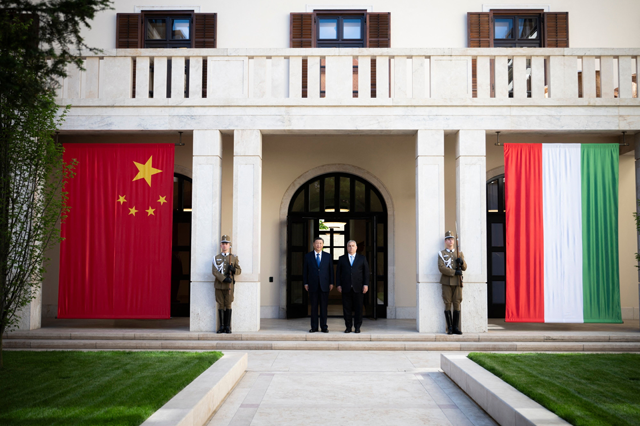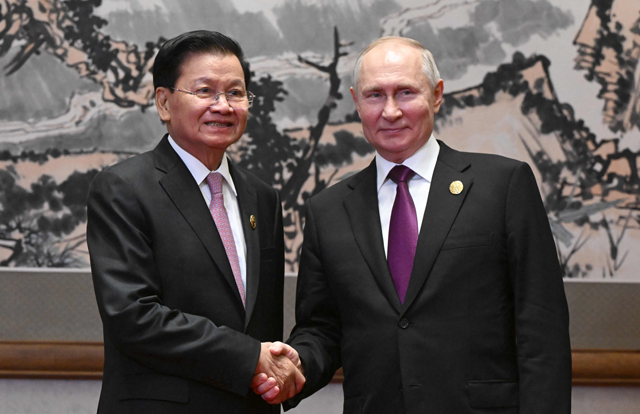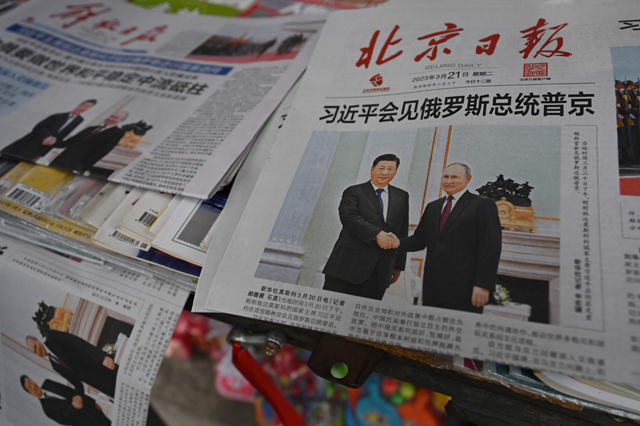You are here
China’s Xi in Hungary to celebrate ‘new era’ with Orban
By AFP - May 09,2024 - Last updated at May 09,2024

Chinese President Xi Jinping (centre left) and Hungarian Prime Minister Viktor Orban stand in front of the Carmelita Monastery, the prime minister’s headquarter, at Buda Castle quarter in Budapest, Hungary prior to their official talks on Thursday (AFP photo)
BUDAPEST — Chinese President Xi Jinping visited Hungary on Thursday seeking a “new journey” with Beijing’s closest European Union ally amid Beijing’s divisions with the West over the Ukraine war and global trade.
The state visit to Hungary is the last leg of Xi’s European tour, his first to the continent since 2019.
In recent years, the Central European country of 9.6 million people has attracted a flood of major Chinese projects, mostly related to the manufacture of electric vehicles and batteries.
Hungarian President Tamas Sulyok warmly received Xi and his wife Peng Liyuan with military honours in the courtyard of the presidential palace in Budapest on Thursday morning.
The Chinese leader arrived in the Hungarian capital on Wednesday night after wrapping up his visit to Serbia, and later attended a state dinner with Prime Minister Viktor Orban.
Budapest was decked out with Chinese flags and placed under tight security, while Tibetan flags were hidden from sight.
In an op-ed published in Hungary’s pro-government Magyar Nemzet daily ahead of his arrival, Xi praised a “long-standing friendship” he described “as mellow and rich as Tokaji wine”, referring to the renowned Hungarian vineyards region.
“We have gone through hardships together and defied power politics together amid volatile international situations.
“Our bilateral relationship is at its best in history and has embarked on a golden voyage... On the new journey of the new era, China looks forward to working closely with our Hungarian friends,” he wrote.
Deepening ties
Frequently at loggerheads with Brussels, Orban has been pursuing an eastwards foreign policy since his return to power in 2010, seeking closer economic ties with Russia, China and other Asian countries.
The nationalist premier remained committed to his strategy even as tensions between Western nations and Beijing increased over human rights violations, the COVIDpandemic, trade and Russia’s invasion of Ukraine.
Xi’s three-day visit to Hungary marks 75 years of diplomatic relations between the two nations.
Since Hungary began to promote itself as a global hub for EV manufacturing in 2022, several new Chinese businesses have sprung up all over the country.
According to the Hungarian government, the two countries are expected to sign at least 16 different agreements promoting their cooperation in rail and road infrastructure, nuclear energy and the automotive industry.
Xi will meet Orban for talks later on Thursday before delivering a statement to the press.
The Chinese leader is due to leave Hungary on Friday afternoon.
Message to Europe
Earlier this week, the Chinese leader kicked off his trip in France, a visit that was cordial but also highlighted tensions between Beijing and the EU over the war in Ukraine and global trade.
While French President Emmanuel Macron pressed a message to Beijing not to support Russia’s war against Ukraine and to accept fairer trade, Hungary will provide “a friendlier destination for Xi”, said political scientist Ja Ian Chong of the University of Singapore.
In Hungary, a country with close ties to both Moscow and Beijing, Xi will be able to “avoid tough conversations and awkward questions”, he added.
Both countries have called for a peaceful settlement of Russia’s war in Ukraine.
“Hungary provides a diplomatic win for Xi, showing his warm ties with an EU member state that will still roll out the red carpet for Chinese investment,” said Xiaoxue Martin, a researcher at the Clingendael China Centre.
“Xi’s message to the rest of Europe: this is how China would like to be treated in Europe,” she added.
On the streets of Budapest, Hungarians were divided over the visit.
“Money does not smell, as they say, so other countries would welcome the kind of investment that is going to happen here, even in Western Europe I assume,” said 52-year-old security manager Laszlo Toth.
But Tibor Hendre, head of the Tibet Support Association, said he was worried that Hungary was “getting into... a debt trap, from which we cannot really escape”.
Software engineer Dezso Bereknyei, 46, said that “financial benefits” appeared to be driving the cooperation, and were “coming before environmental protection”.
Related Articles
BEIJING — Chinese President Xi Jinping told Hungarian Prime Minister Viktor Orban on Monday that world powers should help Russia and Ukraine
BEIJING — Russian President Vladimir Putin arrived in China on Tuesday to meet his “dear friend” Xi Jinping and bolster their relationship a
MOSCOW — Xi Jinping said Tuesday that China would prioritise ties with Russia, calling the two "great neighbouring powers" as he prepared fo














